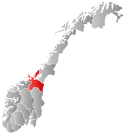Orkland Municipality (1920-1963)
Orkland Municipality
Orkland herred | |
|---|---|
 Sør-Trøndelag within Norway | |
 Orkland within Sør-Trøndelag | |
| Coordinates: 63°11′17″N 09°45′58″E / 63.18806°N 9.76611°E | |
| Country | Norway |
| County | Sør-Trøndelag |
| District | Orkdalen |
| Established | 1 Jan 1920 |
| • Preceded by | Orkdal in 1920 |
| Disestablished | 1 Jan 1963 |
| • Succeeded by | Orkdal in 1963 |
| Administrative centre | Vormstad |
| Area (upon dissolution) | |
| • Total | 169 km2 (65 sq mi) |
| Population (1963) | |
| • Total | 1,707 |
| • Density | 10/km2 (26/sq mi) |
| Time zone | UTC+01:00 (CET) |
| • Summer (DST) | UTC+02:00 (CEST) |
| ISO 3166 code | NO-1637[1] |
Orkland is a former municipality in the old Sør-Trøndelag county, Norway. The municipality existed only for a short time, from 1920 until 1963. The 169-square-kilometre (65 sq mi) municipality encompassed the central part of what is now the municipality of Orkland in Trøndelag county. The main church of the municipality was Moe Church, just south of the village of Vormstad, the administrative centre of the municipality. Most of the population lived in the Orkdalen valley along the river Orklaelva and near the lake Hostovatnet. The main village areas were Vormstad, Svorkmo, and Hoston.[2]
History
The municipality of Orkland was originally a part of the municipality of Orkdal (see formannskapsdistrikt), but on 1 July 1920 it was separated from Orkdal to form a new municipality of its own. Initially, it had a population of 1,760. During the 1960s, there were many municipal mergers across Norway due to the work of the Schei Committee. On 1 January 1963, the municipalities of Orkland, Orkanger, Orkdal, and Geitastrand were merged to form a new, larger municipality of Orkdal. Prior to the merger, Orkland had a population of 1,707.[3]
Government
All municipalities in Norway, including Orkland, are responsible for primary education (through 10th grade), outpatient health services, senior citizen services, unemployment and other social services, zoning, economic development, and municipal roads. The municipality is governed by a municipal council of elected representatives, which in turn elects a mayor.[4]
Municipal council
The municipal council (Herredsstyre) of Orkland was made up of representatives that were elected to four year terms. The party breakdown of the final municipal council was as follows:
| Party name (in Norwegian) | Number of representatives | |
|---|---|---|
| Labour Party (Arbeiderpartiet) | 6 | |
| Christian Democratic Party (Kristelig Folkeparti) | 3 | |
| Centre Party (Senterpartiet) | 5 | |
| Liberal Party (Venstre) | 3 | |
| Total number of members: | 17 | |
| Party name (in Norwegian) | Number of representatives | |
|---|---|---|
| Labour Party (Arbeiderpartiet) | 7 | |
| Christian Democratic Party (Kristelig Folkeparti) | 2 | |
| Farmers' Party (Bondepartiet) | 4 | |
| Liberal Party (Venstre) | 3 | |
| Local List(s) (Lokale lister) | 1 | |
| Total number of members: | 17 | |
| Party name (in Norwegian) | Number of representatives | |
|---|---|---|
| Labour Party (Arbeiderpartiet) | 6 | |
| Christian Democratic Party (Kristelig Folkeparti) | 2 | |
| Farmers' Party (Bondepartiet) | 4 | |
| Liberal Party (Venstre) | 4 | |
| Total number of members: | 16 | |
| Party name (in Norwegian) | Number of representatives | |
|---|---|---|
| Labour Party (Arbeiderpartiet) | 5 | |
| Christian Democratic Party (Kristelig Folkeparti) | 2 | |
| Farmers' Party (Bondepartiet) | 4 | |
| Liberal Party (Venstre) | 5 | |
| Total number of members: | 16 | |
| Party name (in Norwegian) | Number of representatives | |
|---|---|---|
| Labour Party (Arbeiderpartiet) | 5 | |
| Christian Democratic Party (Kristelig Folkeparti) | 2 | |
| Farmers' Party (Bondepartiet) | 4 | |
| Liberal Party (Venstre) | 5 | |
| Total number of members: | 16 | |
| Party name (in Norwegian) | Number of representatives | |
|---|---|---|
| Labour Party (Arbeiderpartiet) | 5 | |
| Farmers' Party (Bondepartiet) | 4 | |
| Liberal Party (Venstre) | 7 | |
| Total number of members: | 16 | |
| Note: Due to the German occupation of Norway during World War II, no elections were held for new municipal councils until after the war ended in 1945. | ||
See also
References
- ^ Bolstad, Erik; Thorsnæs, Geir, eds. (2023-01-26). "Kommunenummer". Store norske leksikon (in Norwegian). Kunnskapsforlaget.
- ^ Store norske leksikon. "Orkland" (in Norwegian). Retrieved 2011-01-26.
- ^ Jukvam, Dag (1999). "Historisk oversikt over endringer i kommune- og fylkesinndelingen" (PDF) (in Norwegian). Statistisk sentralbyrå.
- ^ Hansen, Tore, ed. (2016-05-12). "kommunestyre". Store norske leksikon (in Norwegian). Kunnskapsforlaget. Retrieved 2020-02-02.
- ^ "Kommunevalgene og Ordførervalgene 1959" (PDF) (in Norwegian). Oslo: Statistisk sentralbyrå. 1960. Retrieved 2020-04-20.
- ^ "Kommunevalgene og Ordførervalgene 1955" (PDF) (in Norwegian). Oslo: Statistisk sentralbyrå. 1957. Retrieved 2020-04-20.
- ^ "Kommunevalgene og Ordførervalgene 1951" (PDF) (in Norwegian). Oslo: Statistisk sentralbyrå. 1952. Retrieved 2020-04-20.
- ^ "Kommunevalgene og Ordførervalgene 1947" (PDF) (in Norwegian). Oslo: Statistisk sentralbyrå. 1948. Retrieved 2020-04-20.
- ^ "Kommunevalgene og Ordførervalgene 1945" (PDF) (in Norwegian). Oslo: Statistisk sentralbyrå. 1947. Retrieved 2020-04-20.
- ^ "Kommunevalgene og Ordførervalgene 1937" (PDF) (in Norwegian). Oslo: Statistisk sentralbyrå. 1938. Retrieved 2020-04-20.

